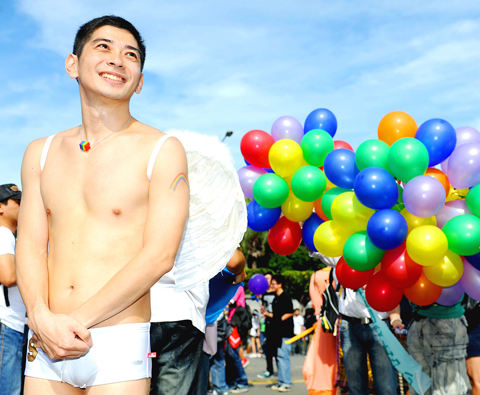Rainbow flags covered downtown Taipei yesterday afternoon as thousands of participants in this year’s Taiwan Lesbian, Gay, Bisexual and Transgender (LGBT) Pride Parade took to the streets, calling on the government to better protect gay rights.
During the parade, songs from romantic and pop genres clashed with heavy metal and trance music. Slogans were shouted by dozens of different organizations. Spectators shouted encouragement. Others just stood, endlessly clicking away on their cameras.
Now in its seventh year, the Taiwan LGBT Pride has grown from a humble gathering of 500 participants in 2003 to become the largest annual LGBT parade in Asia. Organizers estimated that there were more than 25,000 participants this year, 5,000 more than they had originally expected.

PHOTO: WANG MIN-WEI, TAIPEI TIMES
As the revelers snaked their way through the busy streets of Taipei, passing by 228 Peace Park (228和平公園), Ximending (西門町) and Zhongxiao W Road, spectators gathered to watch the parade.
“We support this [event] 120 percent,” spectator Simon Chan said. “I think this event will let the public understand more about gay culture.”
The slogan this year was “Love Out Loud” (同志愛很大) as parade organizers hoped to encourage members of the public to love and not discriminate against their lesbian, gay, transgender, transsexual or transvestite relatives, colleagues and neighbors. They also called on the government to do more to protect their rights and lifestyle choice. They went on to say that both of the nation’s main parties have neglected their demands.
“We want to emphasize that we love this society and its people,” said Ann Tung (童楚楚), convener-in-chief of this year’s parade. “We want to exchange our love for the public’s recognition.”
This was a frank reference to an anti-gay march held last Saturday by several Christian groups. The groups were led by two former Presbyterian Church pastors who emphasized the traditional definition of marriage.
That however, failed to deter the participants, who gathered in 30°C temperatures yesterday. Parade organizers later said that more than 100 organizations showed up to voice their support, including students from National Taiwan University as well as doctors and teachers’ organizations.
Groups from the US, Europe and Japan also joined the parade.
“I think [Taiwan’s] gay scene is amazing,” said a spectator named Maria, who was visiting from the US. “It’s not that different to the one we have in Chicago.”
“Taiwan is very outgoing. Even in Japan it is more conservative,” said Naiyuki Fukai, who is an organizer for next year’s Tokyo Pride event.
The event ended at 7pm following performances by Tony Fish (大炳) and Fish Leong (梁靜茹), who was the parade’s “rainbow ambassador” this year.
Tung later expressed hope that this annual event could spread to Kaohsiung and Taichung next year.

A preclearance service to facilitate entry for people traveling to select airports in Japan would be available from Thursday next week to Feb. 25 at Taiwan Taoyuan International Airport, Taoyuan International Airport Corp (TIAC) said on Tuesday. The service was first made available to Taiwanese travelers throughout the winter vacation of 2024 and during the Lunar New Year holiday. In addition to flights to the Japanese cities of Hakodate, Asahikawa, Akita, Sendai, Niigata, Okayama, Takamatsu, Kumamoto and Kagoshima, the service would be available to travelers to Kobe and Oita. The service can be accessed by passengers of 15 flight routes operated by

GIVE AND TAKE: Blood demand continues to rise each year, while fewer young donors are available due to the nation’s falling birthrate, a doctor said Blood donors can redeem points earned from donations to obtain limited edition Formosan black bear travel mugs, the Kaohsiung Blood Center said yesterday, as it announced a goal of stocking 20,000 units of blood prior to the Lunar New Year. The last month of the lunar year is National Blood Donation Month, when local centers seek to stockpile blood for use during the Lunar New Year holiday. The blood demand in southern Taiwan — including Tainan and Kaohsiung, as well as Chiayi, Pingtung, Penghu and Taitung counties — is about 2,000 units per day, the center said. The donation campaign aims to boost

ENHANCING EFFICIENCY: The apron can accommodate 16 airplanes overnight at Taoyuan airport while work on the third runway continues, the transport minister said A new temporary overnight parking apron at Taiwan Taoyuan International Airport is to start operating on Friday next week to boost operational efficiency while the third runway is being constructed, the Ministry of Transportation and Communications said yesterday. The apron — one of the crucial projects in the construction of the third runway — can accommodate 16 aircraft overnight at the nation’s largest international airport, Minister of Transportation and Communications Chen Shih-kai (陳世凱) told reporters while inspecting the new facility yesterday morning. Aside from providing the airport operator with greater flexibility in aircraft parking during the third runway construction,

American climber Alex Honnold is to attempt a free climb of Taipei 101 today at 9am, with traffic closures around the skyscraper. To accommodate the climb attempt and filming, the Taipei Department of Transportation said traffic controls would be enforced around the Taipei 101 area. If weather conditions delay the climb, the restrictions would be pushed back to tomorrow. Traffic controls would be in place today from 7am to 11am around the Taipei 101 area, the department said. Songzhi Road would be fully closed in both directions between Songlian Road and Xinyi Road Sec 5, it said, adding that bidirectional traffic controls would